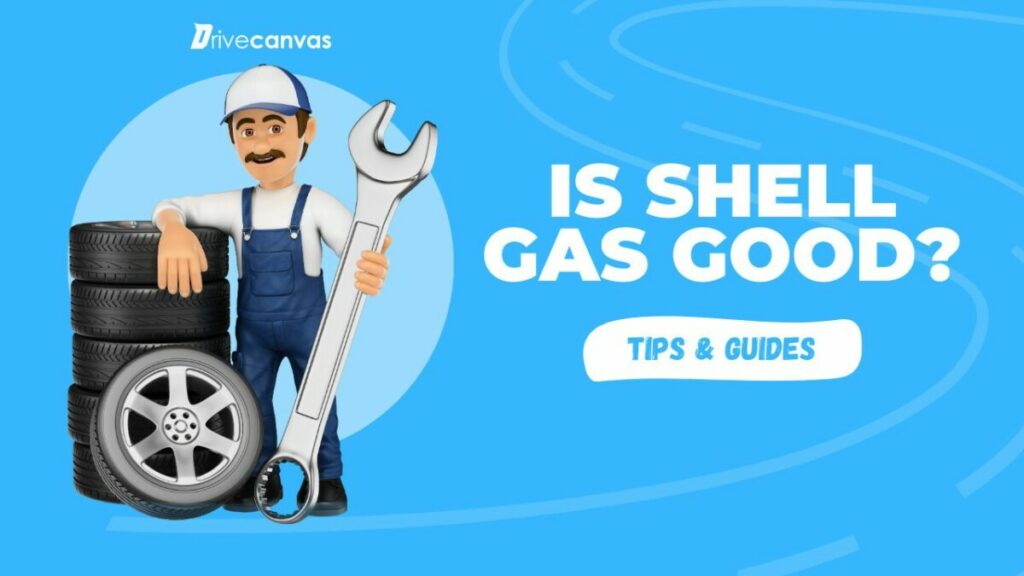Wondering why everyone’s talking about Shell gas?
Well, you’ve come to the right spot!
Known for being a top-tier fuel, Shell gas is packed with superior additives that can help clean your engine and rev up its performance.
However, it’s important to remember that the kind of gas you use isn’t the only thing that matters.
Your car’s make and model, the conditions you’re driving in, and how well you maintain your ride all play a part too.
Let’s dig a bit deeper to find out if Shell gas is actually worth all the hype for your wheels.
Is Shell Gas Worth My Money?
Sure thing, Shell gas is considered as top-notch quality. Shell also has superior gas variants that come with additives, providing additional benefits for your engine.
So, you’ve likely heard about these ‘Top Tier’ fuel brands, right? Well, let me tell you, not all gas is created equal, and Shell happens to be one of the elite few that are part of this exclusive club.
Now, what makes Shell gas stand out is this super cool, advanced blend of detergent additives they use – a signature feature of Top Tier fuels.
The real magic happens when these additives get to work. They act like a tiny army, fighting off carbon buildup on critical parts of your engine, like your fuel injectors, intake valves, and cylinders. The result? Your engine runs smoother, purrs louder, and performs better.
Now, don’t just take my word for it. There was this study by AAA where they compared Top Tier fuels, and guess what they found? Engines that were powered by Top Tier fuels, like Shell, had 19 times fewer carbon deposits than the ones running on standard fuels. Talk about a clean sweep, huh?
But hey, don’t let this give you a false sense of security. Just because you’re filling up with top-notch fuel doesn’t mean you can ignore other aspects of your car’s health. You’ve got to consider stuff like your driving conditions and how well you’re maintaining your ride. After all, your fuel system’s overall health is a team game.
Just remember to keep it all in check, alright?
The Role of Shell Gas in Carbon Buildup Reduction

Ever wondered about how Shell gas could be your engine’s best friend by minimizing carbon buildup? Well, let me spill the beans.
An AAA study has shown that using top-notch fuels like Shell can seriously cut down on carbon deposits. And guess what? Some car enthusiasts have personally noticed their engine’s game stepping up, thanks to lower carbon buildup.
Sounds pretty rad, right?
Shell Gas Impact
When you’re talking about keeping carbon buildup at bay, Shell gas seriously steps up to the plate. Thanks to its Top Tier status and kickass detergent packs, this fuel isn’t messing around. Through its one-of-a-kind formulation, it manages to put a dent in emissions, cutting down on the nasty stuff that ends up polluting our environment.
Here’s the scoop: the additives in this gas are like a cleaning service for your engine. They actively scrub away, reducing the carbon deposits on vital parts of your ride. This leads to a more efficient combustion process, which means fewer emissions – a win-win situation if you ask me.
And trust me, the perks of regularly using Shell gas don’t stop there. Consistent use can actually slow down engine wear and tear, giving your car a longer and healthier life. So, Shell gas doesn’t just keep carbon buildup in check, it also gives a major boost to your vehicle’s overall health.
Honestly, it’s a pretty solid choice for your engine.
AAA Study Findings
So, check this out. There’s this study by AAA that’s all about fuel, and it’s got some pretty cool findings.
You know when you swing by Shell to fill up your tank? Turns out, you’re getting way more than just gas. You’re basically getting a secret weapon against carbon buildup.
This research is all about showing how quality fuels like Shell are total game-changers when it comes to reducing those nasty carbon deposits in your engine. We’re talking about the critical bits of your ride like fuel injectors, intake valves, and cylinders. Shell has this special mix of additives that keep your engine running smooth and efficient. And let’s be real, who doesn’t love the idea of less maintenance?
Think about it. No more stressing over throttle body cleaning or fuel injection flushes. Plus, Shell gas is like a shield against engine issues. You know, the annoying ones like engine knock and misfires. And who can say no to better fuel economy?
But hey, let’s not forget. The kind of car you drive, the conditions you drive in, and how well you maintain your vehicle – all of these things matter too when it comes to the health of your fuel system. So, stay on top of it all and you’ll be just fine.
Personal Usage Experiences
A bunch of people have been raving about their experience with Shell gas. It seems this stuff seriously knocks it out of the park when it comes to fighting those pesky carbon buildups.
Here’s the scoop when you stack Shell up against other big-name fuels:
- Performance: People are noticing their engines are running smoother and they’re giving credit to Shell for cutting down on carbon gunk in their fuel injectors, intake valves, and cylinders.
- Fuel Efficiency: Shell gas doesn’t just stop at performance. It’s also stepping up the game in fuel efficiency, probably because there’s less carbon sludge messing up the fuel combustion.
- Reduced Maintenance: Shell is also helping to save some extra trips to the mechanic. Less carbon buildup means fewer maintenance tasks like throttle body cleaning.
- AAA Study: This study is the real deal. It found that top-tier fuels like Shell resulted in 19 times fewer carbon deposits. So, it’s not just talk – the benefits are real.
But hey, don’t just take my word for it. Your car’s make, how you drive, and how often you service your ride also come into play. Remember, a little love for your car goes a long way.
Insights From the AAA Study on Top Tier Fuels

You might’ve heard a thing or two about Top Tier fuels and their so-called benefits, right? Well, it turns out there’s some truth to the hype. AAA, yep the same guys who rescue you when your car breaks down, did this study. And get this, they found that engines running on Top Tier fuels had a whopping 19 times less carbon buildup than those using non-Top Tier fuels. Talk about a clean machine!
So, what’s the secret sauce? Additives, my friend. These are the unsung heroes in your fuel, working on a molecular level to break down those gnarly carbon compounds that, if left to their own devices, would cause harmful buildup in your engine. Brands like Shell are packing their fuels with these bad boys. The result? Less engine knock, fewer misfires, and a sweet boost to your fuel economy.
When you put Top Tier and non-Top Tier fuels side by side, the difference is like night and day, really. We’re talking major improvements in engine cleanliness and overall performance. So, if you’re wondering if the extra cash for Top Tier fuels is worth it, this AAA study gives a resounding yes. So why not give your car the good stuff? It’ll thank you for it.
The Impact of Additives in Shell Gas and Other Top Tier Fuels

Ever noticed a little extra pep in your ride after filling up with Shell gas or other Top Tier fuels? Well, that’s no coincidence. It’s all about the fuel additives that they pack into it, which seriously level up your car’s performance and lifespan. Let’s dive into how they make the magic happen:
- Super Charged Additives: These bad boys work behind the scenes to cut down on the carbon crud that loves to hang around your fuel injectors, intake valves, and cylinders. The result? Your engine runs like a dream.
- Fuel Brand Face-off: When it comes down to Top Tier fuels like Shell against the rest, it’s not even a fair fight. A study by AAA found that these fuels keep your engine cleaner, hands down.
- Less Upkeep: The best part about cutting down on carbon deposits? You could potentially save a packet on extra maintenance. Who doesn’t love that?
- Peak Performance: The additives work their magic to ensure your combustion is as smooth as butter, squashing any unwanted misfires and engine knock. The end result is your car performing at its absolute best.
Keep in mind, though, your mileage mightn’t be the same across the board. It’s a bit like dating, every car has its own unique quirks and preferences.
Personal Experiences With Shell Gas

You’ve probably noticed a bit of a boost in your ride’s performance after filling up with Shell gas, right? It’s top-tier fuel, after all, known for its loaded detergent packages and additives.
Essentially, they work to cut down on the nasty carbon buildup in your engine, which in turn promotes better health and efficiency for your vehicle.
Plus, it’s a bonus that your car mightn’t need as much upkeep, like throttle body cleaning or fuel injection flushes, all thanks to this high-end fuel.
Not bad, huh?
Performance Improvements Noted
From my own experience, I’ve gotta tell you, Shell gas seriously revs up your car’s performance. Why, you ask? Well, it’s mainly because it reduces carbon buildup and includes some pretty sweet additives. This isn’t just any fuel, it’s Top Tier, baby.
- Cutting Down on Carbon: Shell gas is like a detox for your engine. It cuts down on carbon deposits, which means your car runs better and uses less fuel. Talk about a win-win.
- Additive Advantages: Those special additives in Shell gas? They’re the bomb. They keep your engine from knocking and misfiring, giving you a ride as smooth as butter.
- Fuel System TLC: Because Shell gas reduces carbon buildup, your car’s fuel system doesn’t need as much upkeep. That means more time for you and less cash spent on maintenance. Sounds pretty good, right?
- AAA’s Two Cents: Want some hard evidence? A study by AAA found that Top Tier fuels like Shell left 19 times less carbon deposits. That’s not just impressive, it’s downright mind-blowing.
Reduced Maintenance Observations
So, you’ve been a car owner for a while now, right? And you’ve probably had your fair share of headaches with maintenance work. But here’s the thing, a lot of drivers are noticing that those annoying maintenance gigs are dropping when they switch to Shell gas.
Why’s that, you ask? Well, Shell’s got this Top Tier status, which basically means their gas has got these additives that help cut down on carbon buildup in the engine’s injectors, valves, and cylinders. And less carbon buildup means better engine performance and improved fuel efficiency. It’s all pretty rad, right?
Now, I’m not saying this is a magic solution to all of your car troubles, but a smoother running engine usually means less maintenance work. So, that’s a sweet long-term perk of sticking with Shell gas.
Don’t just take my word for it though. Even the bigwigs at AAA back this up. They reported that cars using Top Tier fuels had 19 times less carbon buildup. But, as with everything in life, there are other factors in play, like the type of ride you’ve got and the driving conditions you’re dealing with.
Evaluating the Influence of Other Factors on Fuel System Performance

Sure, Shell gas and other high-grade fuels can definitely give your ride a bit of an edge, but don’t forget that your car’s performance isn’t just about what you’re putting in the tank. You’ve got to consider the type of car you’re driving, the conditions you’re driving in, how you’re maintaining your ride, and even the marketing hype around different fuels.
So, let’s dig into these aspects a bit more:
First off, the type of car you’re driving. The design and condition of your engine can really mess with your fuel efficiency, so you got to keep that in mind.
Next up, your driving conditions. If you’re always stuck in stop-and-go traffic, driving through extreme weather, or hauling heavy stuff around, your fuel system’s gonna feel the heat.
Then we’ve got your maintenance habits. Changing your oil regularly, rotating your tires, and swapping out filters are all key to keeping your car running smooth.
Lastly, don’t let marketing fool you. Sure, some fuels might sound super awesome in the ads, but sometimes, the hype can exaggerate the actual benefits.
Wrapping Up:

Alright then, getting down to the brass tacks, it’s a wrap-up on this in-depth review of whether Shell Gas is solid or not. However, to run your beast on the road, Shell Gas isn’t the only factor, right? Speaking of which, it’s always beneficial to consider the other vital aspects connected to driving. Look, the quality of the gas you use is essential sure, but there’s more if you’re dealing with luxury beasts like an Audi. Droplets of sweat on your forehead? No, don’t worry, just check out are Audi cars expensive to maintain and clear your doubts.
Moving on, what if you’re hitting the highway and suddenly you have this bad U-Joint in your car that’s been bothering you for a while and you’re stuck thinking how long can you manage? Hey, chill! We’ve got your back. To solve this concern, we got something for you—how long can you drive with a bad U-joint. This guide would certainly provide you some solid time frame.
And you know what else? Winter is coming, so is it too cold out there to wash your beloved ride? Cut off this suspense already, right? So, just visit when is it too cold to wash your car to figure out. So, my friend, there you go! We’ve covered the in-depth review of Shell Gas and dished out some crucial related issues. Hope this benefits your drifting journey. Drive safe!

